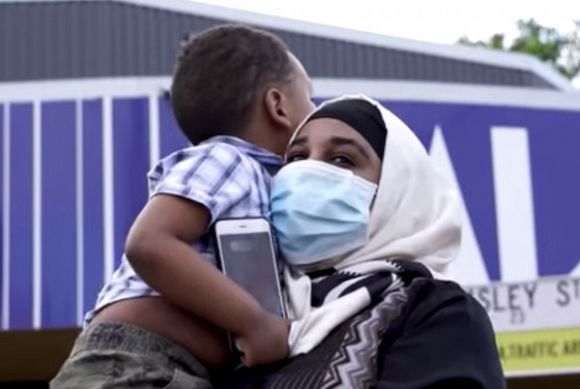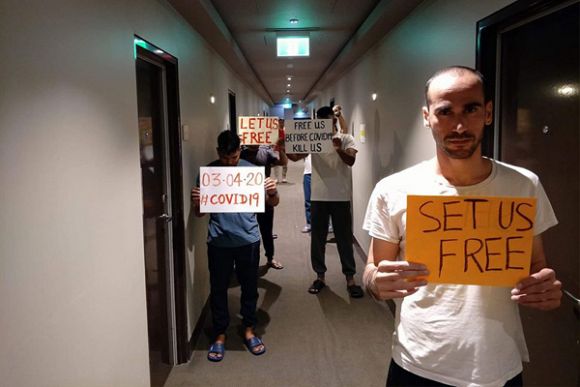Protesters, led by Refugee Solidarity Meanjin, have blockaded the Kangaroo Point Central Hotel in an attempt to free the refugees inside, Michael Williams writes from the ground.
THE HOUR IS LATE. Truck tyres scrap along Main; you can hear the soft murmuring of fellow protesters; but other than that, the night is silent. A cold wind blows. Your shivering hands manage to pull out a cigarette or maybe your iPhone. A telegram message tells you that the guards might be up to something. You peer over the wall that separates you from the guards and from the men inside you are waging a little war to free.
The guards' body language, to you, appears strange and defensive. More defensive than usual, anyway. You hear whispers and then a man in a white shirt takes off inside.
Over time, the warning system will improve, but tonight it is just you and a handful of people who responded to a last-minute callout. A few of them stand around you waiting for you to tell them what you see, but you can't quite put it to words.
There is an intensity in the air. You are inexperienced at this type of thing; another young protester is. His look of determination is matched squarely by your look of uncertainty.
Tonight was a false alarm. It was likely an internal dispute amongst the guards. Or an issue with one of the detainees. Or maybe the guards are just as spooked about you as you are of them. Unconfident, you take your eyes off the guards, put your freezing hands back into your pockets and sit down to a book.
Tonight, there will be no confrontation, but on many nights your comrades have stepped up and done the unthinkable. They have jumped on moving vans and then, in now customary fashion for activists, superglued themselves to the moving vehicle. They have done this and other similar acts so that the men inside, many who have serious medical conditions, may once see the light of day and not the pasty white walls of yet another prison.
You relax and sit at the base of a streetlamp. A fellow protester has contacted one of the men inside. They say he is a musician and they live stream his guitar playing to a small gathering of about six through a JBL speaker someone brought spontaneously.
The rhythm of his strumming reminds you of Tommy Iommi, yet you can’t help but hear pain in between the notes. You hold back the tears and try to channel the music into a book you've been reading.
The nights are bitterly cold, yes. But you choose to stay. The men inside do not get to make that choice. Their agency has been taken away from them.
Many protesters like to curse politicians like Peter Dutton or Annastacia Palaszczuk. And while there is political motivation, you aren't here for those reasons. You are here because if it happened to you, you would hope that someone on the other side would do the same.
Besides, it’s not all bad. You have a place to read, a comfy pillow and good company. As the movement grows, people will bring 'round-the-clock food, exotic music and interesting conversations from around the world.
Still, when it’s all over you will keep coming back to the image in your head — of that first night in the cold, listening to the sound of one lonely guitar.
The Kangaroo Point blockade is being staged on the streets outside of the Kangaroo Point Central Hotel. And while there have been events in the surrounding parks, the blockade has mostly subsisted on the three streets the Hotel faces — Main St, Walmsley St and Lockerbie St.
At over two weeks, the movement has only gained momentum. It is now the largest of its kind and has far surpassed the Baby Asha protests of 2016.
The protests began in April as lockdown laws were being lifted. Back then, activists were tactfully jogging around the block while exercising social distancing — they made sure to fit in breaks in front of the hotel to slowly stretch.
The asylum seekers were brought to the hotel under the recently repealed Medevac laws. Laws that allowed the Government to move detainees who were seriously ill to the mainland for medical treatment. After the repeal, the men are being forcibly transferred to the Brisbane Immigration Transit Accommodation Centre (BITAC) — an onshore detention centre.
This would mean that their treatment will be away from the eyes of public scrutiny. Given Australia's history of neglect in detention centres, this would endanger the detainees.
It would ruin optics for the protesters; a protest outside of BITAC would be much harder to organise and would not have the same power as a demonstration on one of the busiest streets in Brisbane.
The protesters had the choice either to stop protesting and go to their homes or stop the removal of these men. They chose the latter.
Said one unnamed protester:
“I think that this could be the beginning, not so much of refugee justice advocacy, but if we free the men or we better their conditions, we could potentially set a precedent or bring change in the wider community in the campaign for refugee rights.”
Said another:
“But also, for the rights of First Peoples and people of colour. I think the keystone issue for all of these issues is systematic racism.”
We were sat in front of “the vacant lot” on Lockerbie St. Only a week ago, the protesters had set up a camp there but were swiftly asked to move by the owner.
At the blockade's peak, the streets were a valley of tents. The police soon asked people to move those tents which were moved to “the vacant lot”. The tents were then moved on a second time. These setbacks have not deterred the protesters, who are still there 24 hours a day and the blockade is now busy with art and culture.
Removals have been specifically targeted at the outspoken men. Farhad Rahmati was the first man the police tried to remove. This came shortly after he was interviewed on the community radio station 4ZZZ. Other men who have been targeted are the men on the balconies you may see when you drive past.
When asked what he'd say to those who disagreed with the blockade, he said:
There are a few avenues to address this. You could say ‘it’s more expensive and there are other reasons why it doesn’t make sense across the board.' I find what resonates with men is bringing it back to humanity. These people are humans like us. They have interests and skills. They have dislikes and hobbies and families. I guess it’s hard to argue for someone else’s humanity. I think that’s why we’re here because we can give them, the refugees, a platform. I don’t need to tell you so-and-so is a person, they can speak. They are willing and happy to be heard.
For more coverage of the Kangaroo Point Blockade or Deebing Creek, you can also follow associate editor Michael Williams on Twitter and Instagram, both @editorscribble.
Related Articles
- Refugee advocates defend convoy protest as fears grow for detainees
- No luck for asylum seekers in the 'lucky country'
- Do unto refugees
- Australia’s opaque offshore asylum policy on Nauru
- Where the political becomes personal: Inside immigration detention
 This work is licensed under a Creative Commons Attribution-NonCommercial-NoDerivs 3.0 Australia License
This work is licensed under a Creative Commons Attribution-NonCommercial-NoDerivs 3.0 Australia License
Support independent journalism Subscribe to IA.















